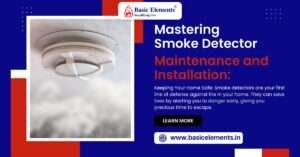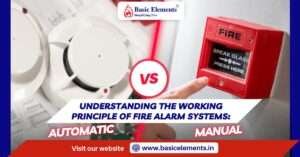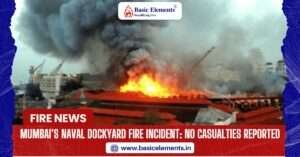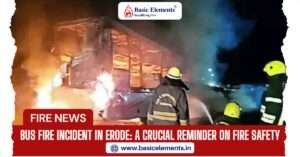Understanding kitchen fire safety in industries is crucial for a safe work environment. Industrial kitchens have unique risks like heat sources, flammable materials, and high-temperature cooking equipment. Implementing safety measures is vital to prevent fires and protect employees. These measures involve equipment maintenance, proper material storage, fire suppression systems, fire prevention training for employees, and evacuation plans.
By focusing on workplace fire prevention, businesses can lower costs and protect their staff. Industrial fire safety is crucial in environments prone to kitchen fires. Investing in safety measures and promoting awareness among employees creates a safer workplace for all.
Common Causes of Fires in Industrial Kitchens and How to Mitigate Them
Fires in industrial kitchens can be caused by various factors, including:
1. Grease buildup: The accumulation of grease on surfaces and equipment can easily ignite and cause a fire.
2. Electrical issues: Faulty wiring, overloaded circuits, or damaged electrical appliances can spark fires.
3. Flammable materials: Improper storage or handling of flammable materials such as cooking oils can lead to fires.
4. Human error: Negligence in following safety protocols, such as leaving cooking unattended or using incorrect cooking techniques.
To mitigate the risk of fires in industrial kitchens, consider implementing the following safety measures.
- Regular maintenance and cleaning: Keep kitchen equipment clean and well-maintained to prevent grease buildup.
- Install fire suppression systems: Equip your kitchen with proper fire extinguishers, sprinkler systems, and hood suppression systems.
- Employee training: Educate staff on fire safety procedures, including how to respond in case of a fire emergency.
- Monitor electrical systems: Regularly inspect wiring and appliances to ensure they are functioning properly and are not posing a fire hazard. By being proactive in addressing these common causes of kitchen fires, you can help prevent accidents and ensure a safer working environment for your staff.
Essential Fire Safety Equipment Every Industrial Kitchen Should Have
Ensuring fire safety in an industrial kitchen is crucial to prevent accidents and minimize risks.
Here are some essential fire safety equipment that every industrial Kitchen Fire Safety should have.
- Fire Extinguishers: There are different types of fire extinguishers suitable for various fire classes, such as Class K for kitchen fires involving cooking oils and fats. It is important to have the right type of extinguisher readily available in case of a fire emergency.
- Kitchen Fire Suppression System: This system is specifically designed to quickly suppress fires in commercial kitchens where grease and high heat are common hazards. It can automatically detect and suppress fires before they escalate.
- Commercial Kitchen Fire Extinguisher Requirements: Industrial kitchens must comply with specific regulations regarding the type, placement, maintenance, and inspection of fire extinguishers. Regular checks ensure that the extinguishers are fully functional when needed.
- Industrial Firefighting Equipment: In addition to basic firefighting equipment like extinguishers, industrial kitchens may need specialized firefighting gear such as flame-resistant clothing, heat-resistant gloves, and protective eyewear for staff working in high-risk areas. By having these essential fire safety equipment in place and ensuring that staff are trained on their proper use, industrial kitchens can enhance their overall safety measures against potential fires.
Creating a Fire Safety Plan for Your Industrial Kitchen: Creating a fire safety plan for an industrial kitchen is crucial to ensure the safety of everyone in the workplace. Here are some steps and best practices to consider.
- Identify Potential Hazards: Start by conducting a thorough assessment of your industrial kitchen to identify any potential fire hazards such as flammable materials, faulty electrical equipment, or improper storage of chemicals.
- Install Fire Safety Equipment: Make sure your industrial kitchen is equipped with essential fire safety equipment such as fire extinguishers, smoke detectors, and sprinkler systems. Regular maintenance and testing of these devices are also important.
- Develop Emergency Procedures: Create a detailed emergency plan that outlines evacuation routes, assembly points, and procedures for alerting employees in case of a fire emergency. Make sure all staff members are familiar with these procedures through regular training sessions.
- Conduct Fire Drills: Practice regular fire drills to ensure that all employees know how to respond quickly and calmly in case of a fire. This will help improve their awareness of evacuation routes and the proper use of firefighting equipment.
- Review and Update Regularly: It’s important to review your fire safety plan regularly and make updates as needed based on changes in the workplace layout, personnel, or equipment.
- Workplace Fire Evacuation Plan Template: You can find templates online that can help guide you in creating a comprehensive workplace fire evacuation plan tailored to your industrial kitchen’s specific needs. By following these steps and best practices, you can help minimize the risk of fires in your industrial kitchen and ensure the safety of everyone working there.
Training Employees on Proper Fire Safety Protocols and Procedures in the Kitchen Setting
- Training kitchen staff on fire safety protocols is crucial for preventing emergencies.
- An effective safety program should include fire prevention, emergency response, equipment use, evacuation procedures, and flammable material handling.
- Educate employees on hazards like grease buildup and faulty equipment.
- Stress the importance of regular maintenance, clear exits, and safety protocol adherence.
- Conduct thorough training and drills to prepare staff for fire incidents.
- Invest in training to save lives and protect the workplace from potential consequences.
Maintaining Ongoing Compliance with Industry Regulations and Standards for Kitchen Fire Safety
Making sure you’re following all the rules and standards for kitchen fire safety is super important to keep everyone safe at work. These regulations cover things like how to prevent fires, maintaining equipment, what to do in emergencies, and making sure your staff knows what to do. They’re there to reduce the chances of fires in commercial kitchens and keep both your team and customers safe.
To stick to these safety rules, it’s key to check and update your fire safety plans regularly. This means checking your gear like fire extinguishers and vents, and making sure your staff is trained on fire safety. Keeping up with the latest rules on kitchen fire safety can help avoid accidents, protect your business, and make your workplace safer for everyone.
In Conclusion, prioritizing workplace safety through industry kitchen fire safety measures is crucial for employee and customer well-being. Implementing fire prevention protocols like equipment inspections, staff training on emergency procedures, and proper flammable material storage reduces fire risks. Investing in fire suppression systems and drills minimizes damage and ensures quick responses. Safety not only saves lives but also protects businesses from disruptions and damage.
Follow US : LinkedIn






